Page 4 • (54 results in 0.037 seconds)
-

The Pacific Lutheran University community recently welcomed Stephanie Johnson, the new dean of the College of Liberal Studies, to campus. Johnson comes to PLU from The College of St. Scholastica, where she most recently served as the chair of the Department of English and Communication.…
Studies, published by Edinburgh University Press. Much of her other published works appear in academic journals including Victorian Literature and Culture, Victorian Poetry, and Theology and Literature. Read Previous Three students share how scholarships support them in their pursuit to make the world better than how they found it Read Next Emma Stafki ’24 recognized for capstone documentary “Echos of the Sound” COMMENTS*Note: All comments are moderated If the comments don't appear for you, you might
-

Human impact on the natural world is impossible to ignore. From severe flooding in Africa, melting of the arctic poles, and fires across Australia, recent years have seen a drastic increase in anomalistic climate events. In response to these problems, Pacific Lutheran University values “thinking…
clear sense of just how their everyday actions affect their surrounding environment, other people, animals, land, water, and air. “Sustainability, necessitated by Holden’s remote location as well as by Lutheran theology, is both practiced and seriously reflected upon here”. In January 2020, the class explored the Lutheran and interfaith dimensions of sustainability even further, working with co-leader and campus pastor, Jen Rude. Holden Village reminds visitors that one can live with less
-
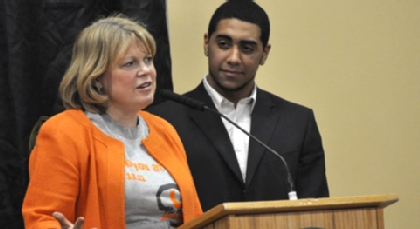
‘Be the Spark’ ignites, unites PLU community By Barbara Clements In a decades-old video shown in the UC this week, Archbishop Desmond Tutu – the keynote speaker at the May 13 “Be the Spark” event – listened carefully as speaker after speaker came before him, telling of beatings…
to become a doctor, but due to the poor quality of the schooling offered to South African blacks, he switched to become a teacher, and then a minister. He received his master’s degree in theology from King’s College in London and returned to minister in South Africa in the late 1960s. In the 1970s, Tutu became actively involved at the frontline of the anti-apartheid movements. He was awarded the Nobel Peace Prize for his efforts in 1984. When asked later by journalist Bill Moyers about the worst
-
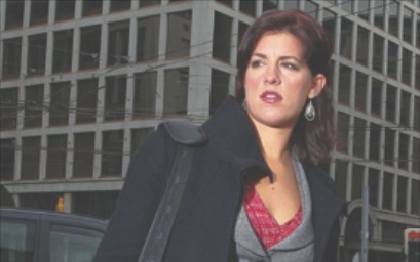
Americans Abroad By Steve Hansen When Jennifer Henrichsen came to PLU, she had every intention of majoring in biology and psychology, and then moving on to medical school. Ambitious – and admirable – plans. But halfway into her sophomore year, she had something of an…
December 1, 2008 Americans Abroad By Steve Hansen When Jennifer Henrichsen came to PLU, she had every intention of majoring in biology and psychology, and then moving on to medical school. Ambitious – and admirable – plans. But halfway into her sophomore year, she had something of an epiphany: Med school was more of her mom’s dream than her own. Jenn Henrichsen ’07 found a passion for world politics and journalism. So she decided to switch directions. Radical directions. “One of PLU’s strengths
-
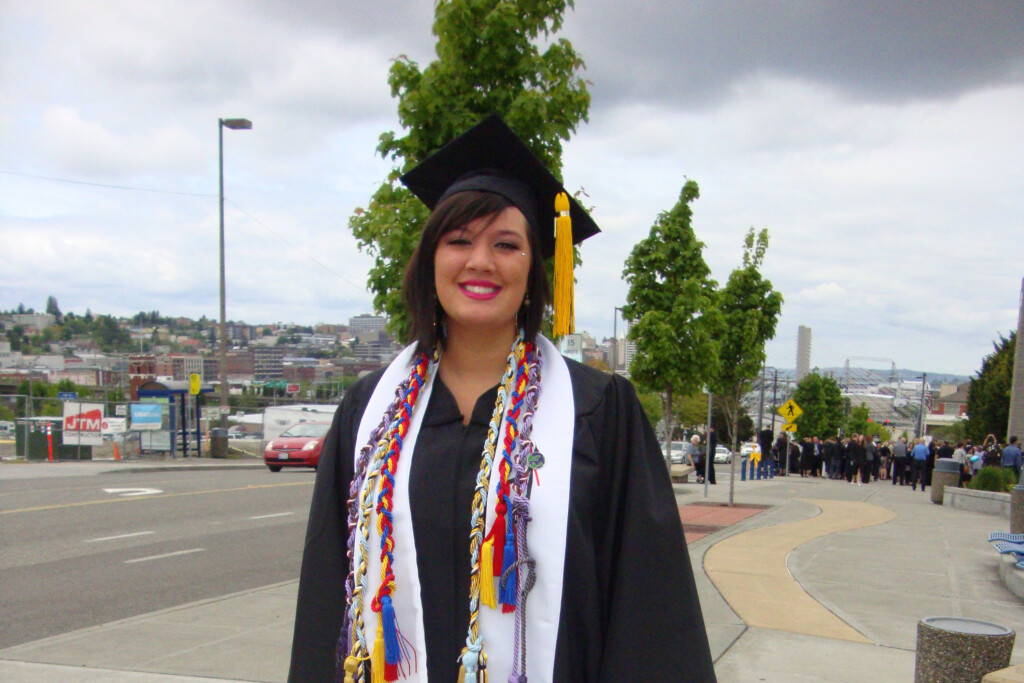
Lizbett Benge ’11 describes her educational journey as “a long and winding road.” It began with her immersion into foster care and deeply influenced her time at PLU, where she grappled with a set of life experiences few of her peers could understand. Benge felt…
. “For some, it literally edifies our entire being to continue studying and to have devoted time or space or structure to do that in a formalized way. “Some of us do get these advanced degrees because that’s how we gain access to resources we can redistribute in radical ways into communities. For me, a really tangible reason that I did it was because I was in a really abusive relationship, and I literally needed to get out of the state.” For the doctorally-curious Benge distills advice down to a
-

Two years ago, the Wang Symposium explored the phenomenon of political and societal polarization, and its effect on our world. This year, the 10th Biennial Wang Symposium comes full circle, with a focus on “Healing: Pathways for Restoration and Renewal.” “Even as I was planning…
, Davis, will deliver a keynote titled “Humanizing Deportation: Research and Care in the Hérida Abierta,” that features the role of storytelling in healing. Elena Calderón, University of Arizona doctoral student and formerly undocumented person, presents “UndocuJoy in Practice: Healing through Joy, Storytelling and Therapy.” Sharon Suh, professor of theology and religious studies at Seattle University, explores trauma and healing from the perspectives of Buddhism and neuroscience, with attention to
-
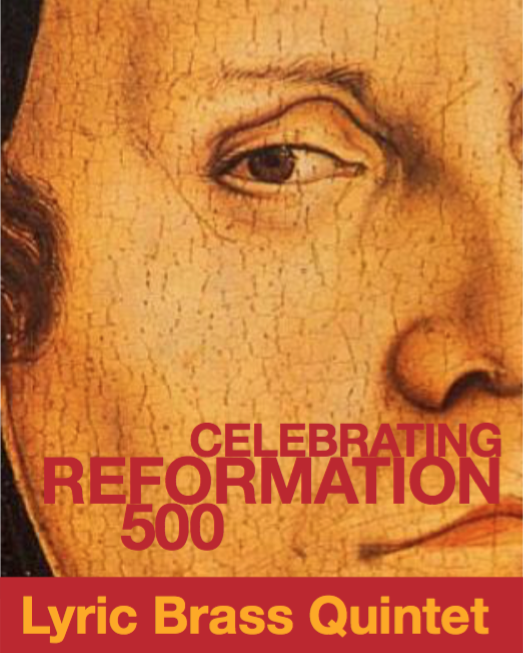
The Lyric Brass Quintet will perform “Luther, Seven Scenes for Brass Quintet” composed by PLU music professor emeritus Jerry Kracht, in commemoration of the 500th anniversary of the Reformation on Sunday, April 23, at 3 p.m. in Lagerquist Concert Hall. “The piece is highly programmatic—that…
case the story of Martin Luther and his journey from young law student to monk, to pilgrim, to theology professor, to critic of the Roman Church, to heretic and fugitive, and finally to founder of the Lutheran Reformation, which we celebrate around the world this year on its 500th anniversary,” Kracht says. “The music is descriptive of that narrative, using both music from Luther’s own time as well as music of my own composition, in a blend that ranges from Renaissance sounds to modern.” The piece
-
Building relationships, building scholars Academic posters, scholarly articles and videos illustrated the intellectual life of the university at the third annual Student-Faculty Research Reception. Sponsored by the Office of the Provost, the reception is just one venue where faculty and student researchers display their work…
faculty members. “To get into a good graduate school,” Don Nothstein said, naming some of the top schools in the country, “to have something like this, especially if it gets published, is necessary.” Past Kelmer Roe fellowship recipients Doug Oakman, dean of the humanities division, and Ronan Rooney ’07 recently accomplished that feat when their co-authored paper, “The Social Origins of Q: Two Theses in a Field of Conflicting Hypotheses,” appeared in the summer issue of the Biblical Theology Bulletin
-
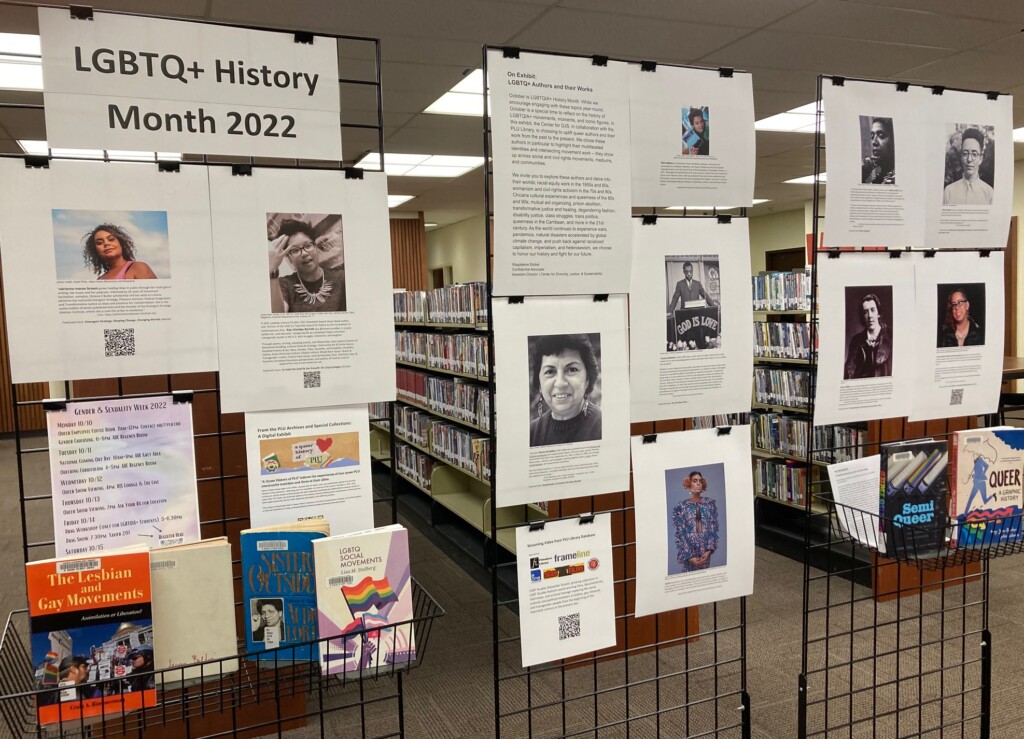
October is LGBTQIA+ History Month. While we encourage engaging with these topics year-round, October is a special time to reflect on the history of LGBTQIA+ movements, moments, and iconic figures. In this exhibit, the Center for DJS, in collaboration with the PLU Library, is choosing…
Stream LGBT Studies films October 2022 Gender and Sexuality Week activities calendar Authors featured in the exhibit: “adrienne maree brown grows healing ideas in public through her multi-genre writing, her music and her podcasts. Informed by 25 years of movement facilitation, somatics, Octavia E Butler scholarship and her work as a doula, adrienne has nurtured Emergent Strategy, Pleasure Activism, Radical Imagination and Transformative Justice as ideas and practices for transformation. She is the
-

Global studies and religion professor Erik Hammerstrom has spent his career researching and teaching about the history of Chinese Buddhism. He’s a quintessential teacher, beloved by students for leading engaging discussions, his imaginative project assignments, and planning field trips to nearby temples. It’s hard to…
open up about struggles with their personal beliefs or how they think about theology, God or the universe. How does this work compare to being a professor? In many ways, being a chaplain is the total opposite of being a professor. Oh, interesting. That’s not necessarily what I was expecting. Why is that? One of the most important things you can do when you enter someone’s room to provide spiritual care is to let go of everything. If you go in with a pre-conceived story about what would be good for
Do you have any feedback for us? If so, feel free to use our Feedback Form.


